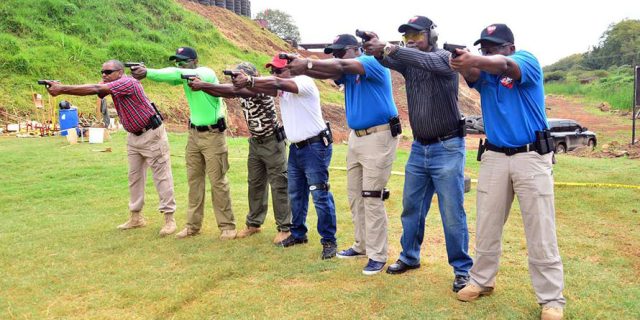Firearms in Kenya are a preserve of the police, politicians, the wealthy and criminal elements. As the trajectory of crime goes up, Kenyans are taking every measure to protect themselves and their families.
This has seen the number of people applying to become gun holders increase. With proper training, a gun is easier to conceal, carry and manage. READ FULL STORY
Handguns go for Ksh100k- Ksh300k while shotguns cost Ksh150k- Ksh350k. Firearms can be purchased at gun dealer shops, like, J.J Okwaro and Co. Ltd. Never buy a gun from an unlicensed dealer as it may be stolen or previously used to commit crimes.
Gun licenses are not just issued to all and sundry. You must be:
Eligibility:
- Be 21 years and above
- Be in good mental and physical health
- Be well trained in handling firearms. A few institutions are licensed to train civilians about firearm handling. They include: National Gun Owners Association, KRRC shooting club and Kenya Bunduki Ltd. A certificate is issued upon completion of training.
- Have no criminal record.
AK 47, G3, MP5 and other military firearms cannot be issued to civilians. In fact, anyone found in possession, risks a jail term of 7 to 15 years.
Procedure of becoming a licensed gun owner
Procedure 1: Application to the firearms bureau.
Visit the firearms bureau located in Nairobi station, off Mandera Road. You will then be given a form to fill with personal data, such as:
- Name and age
- Occupation
- Address
The form will also contain other data, such as:
- Reasons for acquiring the firearm
- Whether you have applied for a license before
- Type of ammunition, caliber.
Fill the form with accurate data. Failure to do so may result in penalty and denial of license.
Procedure 2: Application for a certificate of good conduct/ clearance form
The next step is to visit the Director of Criminal Investigation (DCI) where fingerprints will be taken. A fee of Ksh. 1,050 will be required. This is to facilitate procession of the certificate of good conduct. The certificate will be ready after 2 weeks or a month.
Procedure 3: Submission of Application form
If the clearance form proves no criminal record, submit the filled form to the nearest police station with an application fee of Ksh 2,000. You will be required to attach:
- A photocopy of your Identification Card,
- Doctor’s certificate proving sound mental and physical health
- Certificate of good conduct
- Firearm handling certificate to show you are well trained in handling firearms.
Procedure 4: Review of the application
The application will then be reviewed by the NIS ( National Intelligence Service) then vetted by the firearms licensing bureau. They have to satisfy that you have genuine reason for acquiring a firearm. Once satisfied, the name is forwarded to the Inspector General.
Procedure 5: Clearance by Inspector General.
The Inspector General has the final say. He may approve of disapprove.
Procedure 6: of the license.
Upon approval by the Inspector General, the Chief Licensing officer issues the license.
The license is valid for a year. Therefore, it has to be annually renewed. Those who neglect renewal are liable to a fine of Ksh 500 per day, as long as they continue to default. Failure to pay the fine may result in a sentence of not more than two years.
Application may be denied if you:
- Are not of sound mind
- Are temperamental
- Lack safety gun storage measures
- Provided wrong information at any point during the process
An approved license can be revoked if you:
- Remove the firearm’s serial number
- Misuse the gun whether sober or drunk
- Store the gun carelessly
The license officer revokes the certificate by writing to the holder and demanding he/she surrenders the firearm within 14 days. Failure to comply is an offence with a fine of not more than Ksh 1,000. Convicted felons may also get their license revoked.
A civilian can be permitted to have more than one firearm as long as they are registered. In case of gun theft, report to the nearest police station immediately.
Nobody can inherit a firearm due to owner’s death. The firearm should be surrendered to the authorities and vetting done to whoever wishes to re-acquire the firearm. Remember, the gun owner takes responsibility for any offense committed using it, whether by himself or another party.







